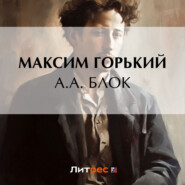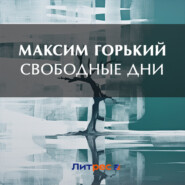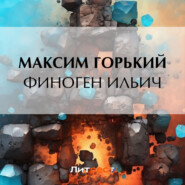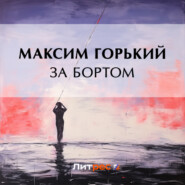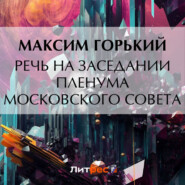По всем вопросам обращайтесь на: info@litportal.ru
(©) 2003-2025.
✖
Through Russia
Настройки чтения
Размер шрифта
Высота строк
Поля
"Well, run along with you."
Softly there next presents herself before the window Felitzata, a woman of about forty with a hawk-like gleam in her coldly civil eyes, and a pair of handsome lips compressed into a covert smile. She is well known throughout the suburb, and once had a son, Nilushka, who was the local "God's fool." Also she has the reputation of knowing what is correct procedure on all and sundry occasions, as well as of being skilled in lamentations, funeral rites, and festivities in connection with the musterings of recruits. Lastly she has had a hip broken, so that she walks with an inclination towards the left.
Her fellow women say of her that her veins contain "a drop of gentle blood"; but probably the statement is inspired by no more than the fact that she treats everyone with the same cold civility. Nevertheless, there is something peculiar about her, for her hands are slender and have long fingers, and her head is haughtily poised, and her voice has a metallic ring, even though the metal has, as it were, grown dull and rusty. Also, she speaks of everyone, herself included, in the most rough and downright terms, yet terms which are so simple that, though her talk may be disconcerting to listen to, it could never be called obscene.
For instance, once I overheard Vologonov reproach her for not leading a more becoming life:
"You ought to have more self-restraint," said he, "seeing that you are a lady, and also your own mistress."
"That is played out, my friend," she replied. "You see, I have had very much to bear, for there was a time when such hunger used to gnaw at my belly as you would never believe. It was then that my eyes became dazzled with the tokens of shame. So I took my fill of love, as does every woman. And once a woman has become a light-o'-love she may as well doff her shift altogether, and use the body which God has given her. And, after all, an independent life is the best life; so I hawk myself about like a pot of beer, and say, 'Drink of this, anyone who likes, while it still contains liquor.'"
"It makes one feel ashamed to hear such talk," said Vologonov with a sigh. In response she burst out laughing.
"What a virtuous man!" was her comment upon his remark.
Until now Antipa had spoken cautiously, and in an undertone, whereas the woman had replied in loud accents of challenge.
"Will you come in and have some tea?" he said next as he leant out of the window.
"No, I thank you. In passing, what a thing I have heard about you!"
"Do not shout so loud. Of what are you speaking?"
"Oh, of SUCH a thing!"
"Of NOTHING, I imagine."
"Yes, of EVERYTHING."
"God, who created all things, alone knows everything."
Whereafter the pair whispered together awhile. Then Felitzata disappeared as suddenly as she had come, leaving the old man sitting motionless. At length he heaved a profound sigh, and muttered to himself.
"Into that Eve's ears be there poured the poison of the asp!.. Yet pardon me, Oh God! Yea, pardon me!"
The words contained not a particle of genuine contrition. Rather, I believe, he uttered them because he had a weakness not for words which signified anything, but for words which, being out of the way, were not used by the common folk of the suburb.
Sometimes Vologonov knocks at the partition-wall with a superannuated arshin measure which has only fifteen vershoki of its length remaining. He knocks, and shouts:
"Lodger, would you care to join me in a pot of tea?"
During the early days of our acquaintanceship he regarded me with marked and constant suspicion. Clearly he deemed me to be a police detective. But subsequently he took to scanning my face with critical curiosity, until at length he said with an air of imparting instruction:
"Have you ever read Paradise Lost and Destroyed?"
"No," I replied. "Only Paradise Regained."
This led him to wag his parti-coloured beard in token that 'he disagreed with my choice', and to observe:
"The reason why Adam lost Paradise is that he allowed Eve to corrupt him. And never did the Lord permit him to regain it. For who is worthy to return to the gates of Paradise? Not a single human being."
And, indeed, I found it a waste of time to dispute the matter, for he merely listened to what I had to say, and then, without an attempt at refutation, repeated in the same tone as before, and exactly in the same words, his statement that "Adam lost Paradise for the reason that he allowed Eve to corrupt him."
Similarly did women constitute our most usual subject of conversation.
"You are young," once he said, "and therefore a human being bound to find forbidden fruit blocking your way at every step. This because the human race is a slave to its love of sin, or, in other words, to love of the Serpent. Yes, woman constitutes the prime impediment to everything in life, as history has many times affirmed. And first and foremost is she the source of restlessness. 'Charged with poison, the Serpent shall plunge in thee her fangs.' Which Serpent is, of course, our desire of the flesh, the Serpent at whose instigation the Greeks razed towns to the ground, and ravaged Troy and Carthagena and Egypt, and the Serpent which caused an amorous passion for the sister of Alexander Pavlovitch [The Emperor Alexander I] to bring about Napoleon's invasion of Russia. On the other hand, both the Mohammedan nations and the Jews have from earliest times grasped the matter aright, and kept their women shut up in their back premises; whereas WE permit the foulest of profligacy to exist, and walk hand in hand with our women, and allow them to graduate as female doctors and to pull teeth, and all the rest of it. The truth is that they ought not to be allowed to advance beyond midwife, since it is woman's business either to serve as a breeding animal or opprobriously to be called neiskusobrachnaia neviesta [Maid who hast never tasted of marriage.] Yes, woman's business should end there."
Near the stove there ticks and clicks on the grimy wall that is papered with "rules and regulations" and sheets of yellow manuscript the pendulum of a small clock, with, hanging to one of its weights, a hammer and a horseshoe, and, to the other, a copper pestle. Also, in a corner of the room a number of ikons make a glittering show with their silver applique and the gilded halos which surmount their figures' black visages, while a stove with a ponderous grate glowers out of the window at the greenery in Zhitnaia Street and beyond the ravine (beyond the ravine everything looks bright and beautiful), and the dusty, dimly lighted storeroom across the passage emits a perennial odour of dried mushroom, tobacco leaves, and hemp oil.
Vologonov stirs his strong, stewed tea with a battered old teaspoon, and says with a sigh as he sips a little:
"All my life I have been engaged in gaining experience so that now I know most things, and ought to be listened to with attention. Usually folk do so listen to me, but though here and there one may find a living soul, of the rest it may be said: 'In the House of David shall terrible things come to pass, and fire shall consume the spirit of lechery.'"
The words resemble bricks in that they seem, if possible, to increase the height of the walls of strange and extraneous events, and even stranger dramas, which loom for ever around, me.
"For example," continues the old man, "why is Mitri Ermolaev Polukonov, our ex-mayor, lying dead before his time? Because he conceived a number of arrogant projects. For example, he sent his eldest son to study at Kazan – with the result that during the son's second year at the University he, the son, brought home with him a curly-headed Jewess, and said to his father: 'Without this woman I cannot live – in her are bound up my whole soul and strength.' Yes, a pass indeed! And from that day forth nothing but misfortune befell in that Yashka took to drink, the Jewess gave way to repining, and Mitri had to go perambulating the town with piteous invitations to 'come and see, my brethren, to what depths I have sunk!' And though, eventually, the Jewess died of a bloody flux, of a miscarriage, the past was beyond mending, and, while the son went to the bad, and took to drink for good and all, the father 'fell a victim by night to untimely death.' Yes, the lives of two folk were thus undone by 'the thorn-bearing company of Judaea.' Like ourselves, the Hebrew has a destiny of his own. And destiny cannot be driven out with a stick. Of each of us the destiny is unhasting. It moves slowly and quietly, and can never be avoided. 'Wait,' it says. 'Seek not to press onward.'"
As he discourses, Vologonov's eyes ceaselessly change colour – now turning to a dull grey, and wearing a tired expression, and now becoming blue, and assuming a mournful air, and now (and most frequently of all) beginning to emit green flashes of an impartial malevolence.
"Similarly, the Kapustins, once a powerful family, came at length to dust-became as nothing. It was a family the members of which were ever in favour of change, and devoted to anything that was new. In fact, they went and set up a piano! Well, of them only Valentine is still on his legs, and he (he is a doctor of less than forty years of age) is a hopeless drunkard, and saturated with dropsy, and fallen a prey to asthma, so that his cancerous eyes protrude horribly. Yes, the Kapustins, like the Polukonovs, may be 'written down as dead.'"
Throughout, Vologonov speaks in a tone of unassailable conviction, in a tone implying that never could things happen, never could things have happened, otherwise than as he has stated. In fact, in his hands even the most inexplicable, the most grievous, phenomena of life become such as a law has inevitably decreed.
"And the same thing will befall the Osmukhins," he next remarks. "Let them be a warning to you never to make friends with Germans, and never to engage in business with them. In Russia any housewife may brew beer; yet our people will not drink it – they are more used to spirits. Also, Russian folk like to attain their object in drinking AT ONCE; and a shkalik of vodka will do more to sap wit than five kruzhki of beer. Once our people liked uniform simplicity; but now they are become like a man who was born blind, and has suddenly acquired sight. A change indeed! For thirty-three years did Ilya of Murom [Ilya Murometz, the legendary figure most frequently met with In Russian bilini (folk songs), and probably identical with Elijah the Prophet, though credited with many of the attributes proper, rather, to the pagan god Perun the Thunderer.] sit waiting for his end before it came; and all who cannot bide patiently in a state of humility…"
Meanwhile clouds shaped like snow-white swans are traversing the roseate heavens and disappearing into space, while below them, on earth, the ravine can be seen spread out like the pelt of a bear which the broad shoulders of some fabulous giant have sloughed before taking refuge in the marshes and forest. In fact the landscape reminds me of sundry ancient tales of marvels, as also does Antipa Vologonov, the man who is so strangely conversant with the shortcomings of human life, and so passionately addicted to discussing them.
For a moment or two he remains silent as sibilantly he purses his lips and drinks some saffron-coloured tea from the saucer which the splayed fingers of his right hand are balancing on their tips. Whereafter, when his wet moustache has been dried, his level voice resumes its speech in tones as measured as those of one reading aloud from the Psalter.
"Have you noticed a shop in Zhitnaia Street kept by an old man named Asiev? Once that man had ten sons. Six of them, however, died in infancy. Of the remainder the eldest, a fine singer, was at once extravagant and a bookworm; wherefore, whilst an officer's servant at Tashkend, he cut the throats of his master and mistress, and for doing so was executed by shooting. As a matter of fact, the tale has it that he had been making love to his mistress, and then been thrown over in favour of his master once more. And another son, Grigori, after being given a high school education at St. Petersburg, became a lunatic. And another, Alexei, entered the army as a cavalryman, but is now acting as a circus rider, and probably has also become a drunkard. And the youngest son of all, Nikolai, ran away as a boy, and, eventually arriving in Norway with a precious scheme for catching fish in the Arctic Ocean, met with failure through the fact that he had overlooked the circumstance that we Russians have fish of our own and to spare, and had to have his interest assigned by his father to a local monastery. So much for fish of the Arctic Seas! Yet if Nikolai had only waited, if he had only been more patient, he – "
Here Vologonov lowers his voice, and continues with something of the growl of an angry dog:
"I too have had sons, one of whom was killed at Kushka (a document has certified to that effect), another was drowned whilst drunk, three more died in infancy, and only two are still alive. Of these last, I know that one is acting as a waiter in a hotel at Smolensk, while the other, Melenti, was educated for the Church, sent to study in a seminary, induced to abscond and get into trouble, and eventually dispatched to Siberia. There now! Yes, the Russian is what might be called a 'lightweighted' individual, an individual who, unless he holds himself down by the head, is soon carried off by the wind like a chicken's feather – for we are too self-confident and restless. Before now, I myself have been a gull, a man lacking balance: for never does youth realise its own insignificance, or know how to wait."
Dissertations of the kind drop from the old man like water from a leaky pipe on a cold, blustery day in autumn. Wagging his grey beard, he talks and talks, until I begin to think that he must be an evil wizard, and master of this remote, barren, swampy, ravine-pitted region – that he it is who originally planted the town in this uncomfortable, clayey hollow, and has thrown the houses into heaps, and entangled the streets, and wantonly created the town's unaccountably rude and rough and deadly existence, and addled men's brains with disconnected nonsense, and consumed their hearts with a fear of life. Yes, it comes to me that it must be he who, during the long six months of winter, causes cruel snowstorms from the plain to invade the town, and with frost compresses the buildings of the town until their rafters crack, and stinging cold brings birds to the ground. Lastly, I become seized with the idea that it must be he who, almost every summer, envelops the town in those terrible visitations of heat by night which seem almost to cause the houses to melt.
However, as a rule he maintains complete silence, and merely makes chewing motions with his strong-toothed jaws as he sits wagging his beard from side to side. At such times there is in his eyes a bluish fire like the gleam of charcoal, while his crooked fingers writhe like worms, and his outward appearance becomes sheerly that of a magician of iniquity.
Once I asked him:
"What in particular ought men to wait for?"
For a while he sat clasping his beard, and, with contracted eyes, gazing as at something behind me. Then he said quietly and didactically:
"Someday there will arise a Strange Man who will proclaim to the world the Word to which there never was a beginning. But to which of us is the hour when that Man will arise known? To none of us… And to which of us are known the miracles which that Word will perform? To none of us."
Once upon a time there used to glide past the window of my room the fair, curly, wavering, golden head of Nilushka the idiot, a lad looking like a thing which the earth has begotten of love. Yes, Nilushka was like an angel in some sacred picture adorning the southern or the northern gates of an ancient church, as, with his flushed face smeared with wax-smoke and oil, and his light blue eyes gleaming in a cold, unearthly smile, and a frame clad in a red smock reaching to below his knees, and the soles of his feet showing black (always he walked on tiptoe), and his thin calves, as straight and white as the calves of a woman, covered with golden down, he walked the streets.












